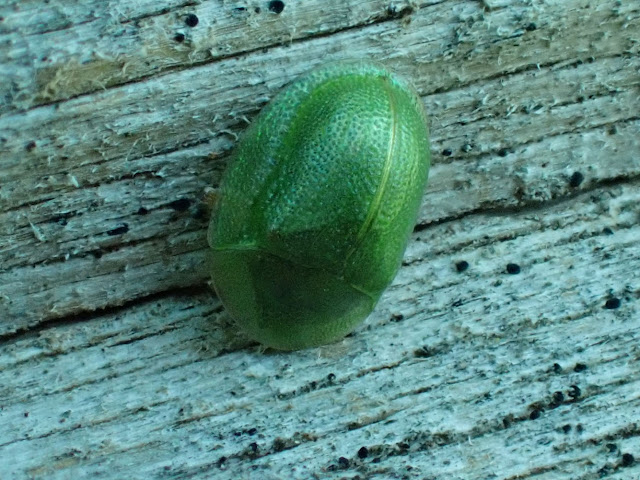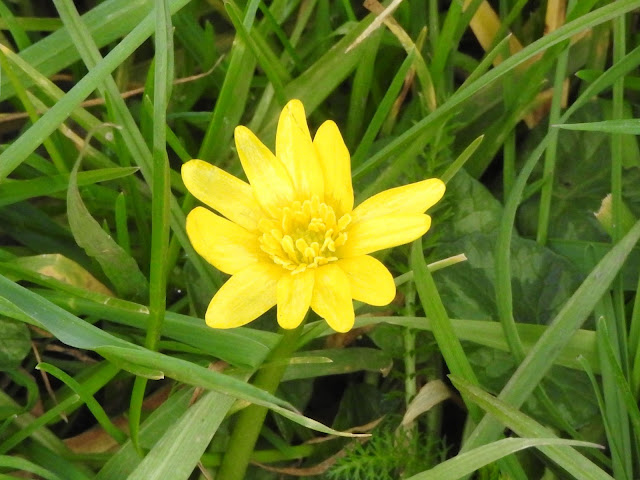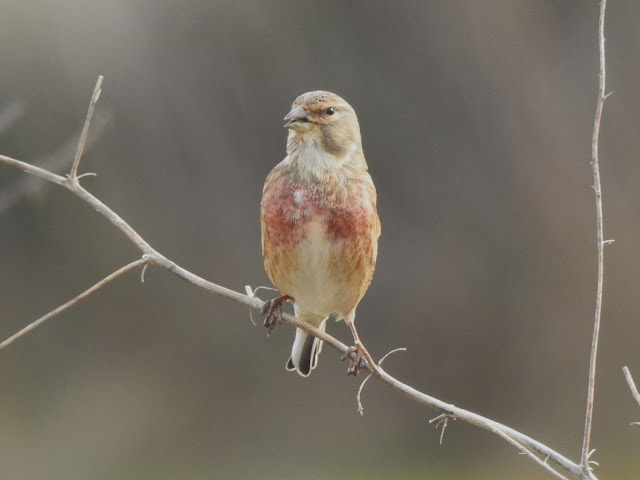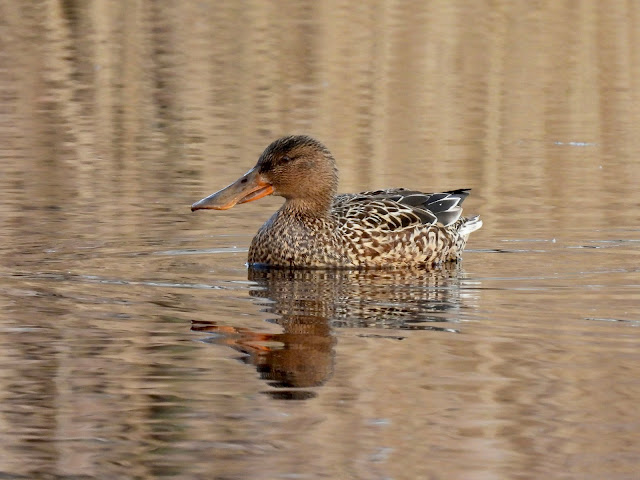A quiet day for birds with the high tide leaving the Bight largely uncovered. The two juvenile Spoonbill paid another visit, initially on Finger Point, but with the low high tide not hindering feeding moved to feed in Shutterton Creek. The Linnet flock wandering Greenland Lake and Golf Course increased to at least 40. The bushes were otherwise noticeably quiet except for vocal tits in their pairs near nest boxes and single Grey Wagtail, Goldcrest and Redwing.
Tuesday, 28 February 2023
Tuesday 28th February
Sunday, 26 February 2023
Sunday 26th February
The first Water Pipit of the year was feeding in the Bight on the rising tide with a Scandinavian Rock Pipit also present. Also in the estuary the two juvenile Spoonbill on Finger Point and counts of 1,350 Dunlin, 778 Oystercatcher, 120 Grey and 31 Ringed Plover, 114 Bar-tailed Godwit, 88 Dark-bellied Brent Geese, 39 Teal, 31 Turnstone, 29 Redshank, 22 Wigeon and five Red-breasted Merganser.
Elsewhere three Goldcrest were on site with five Shoveler on the Main Pond.
Wildlife News: The first Tapered Dronefly Eristalis pertinax of the year was on the wing but there was little other invertebrate activity. On the more sheltered Dune Ridge the first Dune Scarab Aegialia arenarius of the year were also out, with a single Green Tortoise Beetle Cassida viridis, a new species for the Recording Area.
Saturday, 25 February 2023
Saturday 25th February
Friday, 24 February 2023
Friday 24th February
Offshore a lingering raft of 71 Common Scoter, with 17 Great Crested Grebe and a Red-breasted Merganser but no reports of any divers. Elsewhere two Green Woodpecker and a Grey Wagtail were around the Entrance Bushes with a pair of Mute Swan at the Main Pond, the male at least the regular breeding bird, also present, two pairs of Shoveler and vocal Little Grebe and Water Rail.
Wildlife News: The first flowering Lesser Celandine was further proof of the slow arrival of spring.
Thursday, 23 February 2023
Thursday 23rd February
An afternoon meeting at the Golf Club allowed for a quick low tide visit. An unexpected highlight was a new site record 21 Cirl Bunting feeding with a single male Reed Bunting on the course. Elsewhere 22 Dark-bellied Brent Geese were at Langstone Rock, 18 Common Scoter were offshore, and a look from Cockwood Steps revealed 27 Teal, eight Shelduck, two Greenshank and a Grey Wagtail.
Wednesday, 22 February 2023
Wednesday 22nd February
The pair of Goldeneye reappeared, having spent much of the winter nearer Topsham, also in the estuary counts included 1,100+ Dunlin, 293 Dark-bellied Brent Geese, 127 Curlew, 108 Grey Plover, 70 Common Gull, 53 Bar-tailed Godwit, 19 Teal, 17 Wigeon and six Red-breasted Merganser.
Elsewhere the Dartford Warbler made one of its infrequent appearances along the Back Path, eight Jackdaw flew NW and offshore 26 Common Scoter, 23 Red-throated Diver and 23 Great Crested Grebe, with three Shoveler south with two of the Common Scoter.
Tuesday, 21 February 2023
Tuesday 21st February
Flat calm conditions saw a winter high 72 Great Crested Grebe off the seawall along with six Red-throated and four Great Northern Diver, 16 Red-breasted Merganser, also a winter peak, and 12 Common Scoter.
Elsewhere a Chiffchaff was in song in the Entrance Bushes, Blue and Great Tit were squabbling over nest boxes and five Shoveler were on the Main Pond. Counts from the estuary included 1,050 Dunlin, 182 Dark-bellied Brent Geese, 131 Common Gull, 126 Grey and 19 Ringed Plover, 112 Curlew, 101 Bar-tailed Godwit, 34 Teal, 20 Turnstone and 12 Wigeon.
Wildlife News: Few invertebrates about in the dull conditions but that didn't stop another first for the Recording Area being found, a European Chinchbug Ischnodemus sabuleti.
Sunday, 19 February 2023
Sunday 19th February
Saturday, 18 February 2023
Saturday 18th February
Counts from the estuary included the two Avocet with 250 Curlew, 216 Dark-bellied Brent Geese, 57 Turnstone, 56 Redshank, 38 Wigeon, 26 Sanderling and eight Black-tailed Godwit, the highest count this year. Also present 200 Common and a Mediterranean Gull with five Lesser Black-backed Gull including a continental intermedius bird.
Offshore 54 Great Crested Grebe, 45 Kittiwake, eight Red-throated Diver, five Red-breasted Merganser and three Common Scoter whilst 31 Linnet were on site with a pair of Bullfinch and single Redwing, Green and Great Spotted Woodpecker, Reed Bunting, Grey Wagtail and Sparrowhawk. At the Main Pond three Shoveler and two pairs of Little Grebe.
Thursday, 16 February 2023
Thursday 16th February
A quick low tide visit saw 65 Dark-bellied Brent Geese on the mudflats, 21 Great Crested Grebe offshore and three Shoveler on the Main Pond. In Greenland Lake, 25 Meadow Pipit were a welcome sign of the advancing season, backed up by many resident species now in song.
Tuesday, 14 February 2023
Tuesday 14th February
A visit on the dropping tide saw just 470 Dunlin feeding on the mudflats, the remainder having already departed to feeding areas further upriver, also present the two immature Spoonbill, 182 Dark-bellied Brent Geese, 84 Common Gull, 47 Teal, 37 Wigeon, two Avocet and a Greenshank.
Elsewhere the two Eider and a Red-throated Diver were offshore and seven Shoveler were on the Main Pond.
Wildlife News: The rise in temperature together with a sunny afternoon prompted an increase in insect activity with two very early solitary bees - a Yellow-legged Mining Bee Andrena flavipes and a Furry-claspered Furrow Bee Lasioglossum lativentre sharing the one and only Dandelion in flower at Langstone Rock. February records are not unprecedented and are increasing as the climate changes.
Other species emerging for the first time this year included 24-spot Ladybird, the ground bug Peritrechus geniculatus, Lined Froghopper Neophilaenus lineatus and the weevil Trichosirocalus troglodytes.
Sunday, 12 February 2023
Sunday 12th February
Saturday, 11 February 2023
Saturday 11th February
Thursday, 9 February 2023
Thursday 9th February
The first Red Kite of the year, the earliest ever, flew west over Warren Point just after 1pm, the late morning start missed the high tide waders, but the two Spoonbill back on Finger Point were more tardy, waiting till mid tide before departing north.
Elsewhere 93 Dark-bellied Brent Geese were feeding on the beach, a Red-throated Diver and 17 Great Crested Grebe were offshore, three Snipe were in Greenland Lake and three Shoveler and a Chiffchaff were at the Main Pond.
Wednesday, 8 February 2023
Wednesday 8th February
The first Short-eared Owl of the year was on Warren Point, with four Shoveler, three males and a female, at the Main Pond.
Wildlife News: The first Wood (aka Long-tailed Field) Mouse of the year was watched feeding on the nectar-rich Gorse blossom in the afternoon sun.
Tuesday, 7 February 2023
Tuesday 7th February
Sunday, 5 February 2023
Sunday 5th February
Saturday, 4 February 2023
Saturday 4th February
Offshore first thing a roosting flock of just 11 Red-breasted Merganser, this winter's peak count (cf. 204 in Dec 2000), also present five Red-throated and three Great Northern Diver, 36 Great Crested Grebe (cf. 132 in Jan 2018), five Common Scoter and the two immature male Eider.
Elsewhere 143 Dark-bellied Brent Geese, 32 Wigeon and a Greenshank were in the estuary at low tide, with 319 Black-headed, 70 Common and a Mediterranean Gull. In the bushes three Great Spotted and a Green Woodpecker, three Goldcrest, two Redwing and a Chiffchaff, with two male Shoveler on the Main Pond.
Thursday, 2 February 2023
Thursday 2nd February
A low tide visit saw 99 Dark-bellied Brent Geese on the mudflats with another 28 feeding at Langstone Rock with a Greenshank in the estuary and offshore a mobile flock of 61 Common Scoter, 15 Great Crested Grebe and three Red-throated Diver.
Elsewhere four Shoveler were on the Main Pond with 15 Greenfinch, 12 Long-tailed Tit and 10 Redwing in the Entrance Bushes and a flock of 51 Goldfinch west overhead.









%20210223.JPG)
















